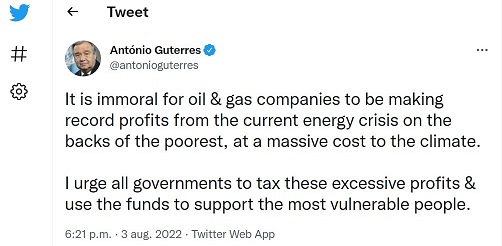What is a a windfall tax? A windfall tax is a higher tax rate on profits that result from a sudden windfall gain to a particular company or industry, often as the result of a geo-political disturbance, war or natural disaster that creates unusual spikes in demand and/or interruptions to supply.

On August 5, 2022 the German Ministry of Finance issued a press release announcing that against the background of the recent intensified political debate on the taxation of exceptionally high profits, mainly caused by the crisis, the independent scientific Advisory Board to the German Federal Ministry of Finance urgently advises against introducing a so-called windfall tax.
In doing so, the Council in particular identified the following key factors:
· In practice, trying to isolate excess profits and tax them on this basis leads to arbitrary burdens and distortions in the production structure, which threatens to have harmful distorting effects.
· Economic activities and the resulting income are fundamentally subject to random fluctuations. In this random ebb and flow, there will inevitably be periods of "overprofit" and periods of "underprofit." If the state were to argue in the periods of "excess profit" that this was unjustified and should be skimmed off for tax purposes, then investment incentives would be reduced and welfare-enhancing activities would not take place.
· In addition, rapidly rising prices and the resulting profit expectations offer incentives to expand production capacities precisely where the shortages are particularly great. Such adjustments are highly desirable from an economic point of view because they direct the economy's scarce resources to uses where they generate the greatest added value. A windfall tax that taxes away all profits that result from the higher price would destroy precisely these incentives for socially desirable capacity expansion.
· This effect is reinforced by the anti-innovation effect. Innovation races typically generate many losers and a few winners. If the profits of the innovation winners were "taxed away" ex post, there would no longer be an ex ante incentive to participate in productive innovation races.
· Confidence in the tax system is based on its compliance with rules. Anyone who realizes a positive income or profit is taxed. For the level of taxation it is irrelevant in which sectors, with which products and in which phases of world events profits are made. Ad hoc taxation of certain activities would destroy much of this long-standing trust.
The full text opinion of the independent scientific Advisory Board to the German Federal Ministry of Finance was made available via the website of the German Federal Ministry of Finance can be found here (only available in the German language).
Copyright – internationaltaxplaza.info




